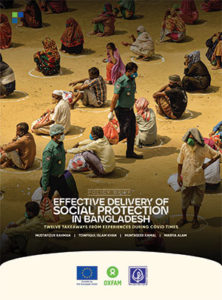 Effective delivery of social protection in Bangladesh
Effective delivery of social protection in Bangladesh
Twelve takeaways from experiences during COVID times
COVID-19 pandemic will leave far-reaching footprints on the development journey of Bangladesh, as also other countries across the world. The pandemic has exacerbated pre-existing vulnerabilities, added new dimensions to these, and disrupted the progress towards attaining the Sustainable Development Goals (SDGs) in Bangladesh. This scenario was further aggravated owing to the natural calamities afflicting Bangladesh in the form of successive floods and the cyclone Amphan in May 2020.
In this backdrop, the Government of Bangladesh (GoB) had launched several support measures in collaboration with the local authorities, which were targeted at the poor and the vulnerable sections of the population. These, inter alia, included cash support of BDT 2,500 each to 5 million households, food (rice) distribution, and cash support under Gratuitous Relief (GR). As is well known, the effectiveness of service delivery during times of urgency and emergency lies at the heart of attaining the expected outcomes. An assessment of the effectiveness is also important to draw insights and lessons to raise the quality of service delivery in the future. Based on a detailed investigation carried out under the study titled “An Assessment of the Effectiveness of Delivering the Relief Supports to Cope with COVID-19 in Bangladesh”, this Policy Brief captures key findings of the study, which focused on service delivery effectiveness at the local level. This covered the three social safety net programmes (SSNPs) mentioned above, which were implemented during the first year of the pandemic. The objectives of the exercise were to identify gaps, draw lessons, and offer concrete suggestions for improvement in the delivery of the services. The objective is also to help improve the quality of interventions considering SDG 16.6 (Develop effective, accountable, and transparent institutions at all levels), particularly in keeping in the purview the interests of the marginalised groups and the SDG spirit of leaving no one behind.
Authors: Mustafizur Rahman, Towfiqul Islam Khan, Muntaseer Kamal and Marfia Alam
Publication period: June 2021


